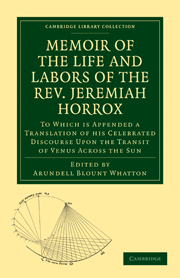 Memoir of the Life and Labors of the Rev. Jeremiah Horrox
Memoir of the Life and Labors of the Rev. Jeremiah Horrox Book contents
PREFACE
Published online by Cambridge University Press: 05 August 2011
Summary
When my father was engaged in writing the Biographical department of the history of Lancashire, he was naturally led to consider the merits of Jeremiah Horrox, the youthful astronomer of that county; and he was so much impressed with his distinguished scientific attainments that, finding it impossible from want of space to do him justice in those pages, he proposed on some future occasion to publish his life in a separate form. Accordingly, he ascertained the precise value of his discoveries, and gathered together much interesting detail connected with his personal history; and he also set about preparing a translation of his celebrated Treatise upon the transit of Venus over the Sun. But he did not live to complete this work. It would appear that much material had been accumulated, but that the arrangement of it had not even been commenced. To him however belongs the credit of being the first and only person who has undertaken to supply what is acknowledged to be a deficiency in the literature of our country; and there can be no doubt that, if his life had been spared a little longer, he would have produced a most interesting and instructive volume. Professor Rigaud, of Oxford, who was his friend and associate in these pursuits, says in his “Correspondence of Scientific Men of the 17th century,” that “the late W. R. Whatton, Esquire, had made considerable collections for a life of Horrox, which he intended to have prefixed to a new edition of the Venus in sole visa, when death in 1835 deprived the world of the fruit of his inquiries.”
- Type
- Chapter
- Information
- Memoir of the Life and Labors of the Rev. Jeremiah HorroxTo Which is Appended a Translation of his Celebrated Discourse Upon the Transit of Venus Across the Sun, pp. vii - xviPublisher: Cambridge University PressPrint publication year: 2010First published in: 1859


